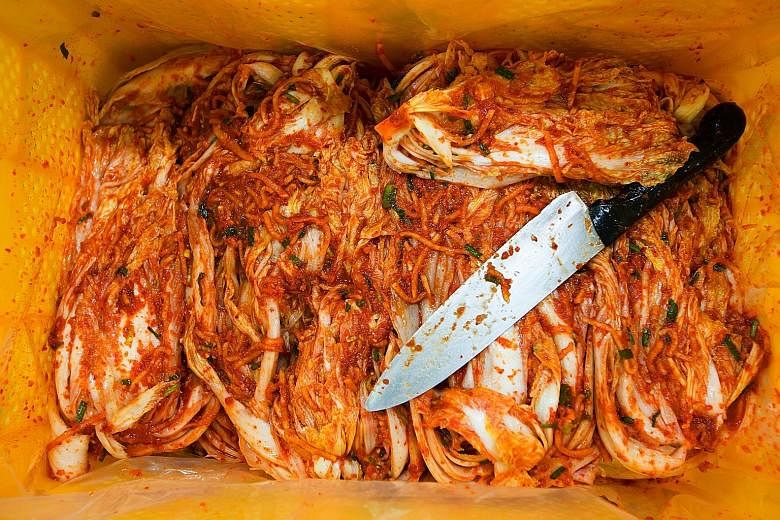SEOUL •If Western consumers on a health kick can be convinced to buy probiotic tea and cultured yogurt, then why would they not be up for spicy pickled cabbage fermented with garlic for months on end?
That is the goal of South Korean scientists at the World Institute of Kimchi on the outskirts of the southern city of Gwangju.
"We are trying to globalise kimchi," said Mr Ha Jae Ho, head of the institute.
South Korea has had notable success with cultural exports. Korean dramas and pop music are huge across Asia, as is Korean plastic surgery.
Korean food has also become the flavour of the day in the West in recent years, with bulgogi meat appearing in fusion tacos and hipster bars making cocktails with soju, the Korean answer to vodka.
But kimchi? Well, it is a hard sell because of its smell.
Even among kimchi-loving Koreans, many have separate kimchi fridges to stop the dish from tainting other food.
If they keep it in their regular fridge, it goes into a vault-like box.
For this reason, scientists are trying to increase the good bacteria - especially the lactic acid that gives kimchi its probiotic qualities - and reduce the bad parts, namely the smell, which is so pungent that it can take days to work its way out of a person's pores.
"Most Western people don't like the smell of kimchi because we use a lot of garlic and ginger and that produces a lot of sulfur compounds," said Mr Ha.
In labs at the institute, scientists are working on the distinctive fumes.
"We're trying to engineer the smell out of kimchi," said researcher Lee Mi Ae.
"But it is difficult because the smell is linked to the flavour of the kimchi."
Kimchi is a side dish in every Korean meal. The standard varieties are made from napa cabbage or large Korean radish.
But there are lots of other types, including those made from cucumber, onions and leafy greens.
The vegetable is salted and usually rubbed with chilli powder, garlic, ginger and scallions.
There are a lot of regional variations, from the mild kimchi of Pyongyang to the super spicy options in the south and the fishy version in coastal areas.
Then, it is left to ferment - the longer the better.
South Koreans eat 26kg of kimchi a year, according to the institute.
They even pack the necessity when they go on vacation and the institute has made space kimchi for South Korea's first astronaut.
"Kimchi is something that makes people turn up their noses, but it is becoming more and more popular in the United States," said Dr Johanna Mendelson Forman, a professor at American University.
Trader Joe's sells jars of kimchi, while Whole Foods carries 163 kimchi products.
Millennials in particular, she added, are interested in experimenting with healthy food and making food as a "craft".
So how can South Korea build on that?
The World Institute of Kimchi holds an international kimchiology symposium and prints a book of frequently asked kimchi questions (last year's volume ran to 186 pages). A poster announces an upcoming 20-week "kimchi sommelier" course.
The world kimchi festival is held there every November. It is around that time of the year, when the weather gets cooler, that Koreans make kimchi.
Naturally, they have had the process recognised by Unesco as an intangible cultural heritage.
Proponents of Korean food, including kimchi, smell a good opportunity for promotion during the Winter Olympics in Pyeongchang in February.
Indeed, Dr Forman said: "There's an overwhelming correlation between knowing a country and having positive opinions about it."
WASHINGTON POST

